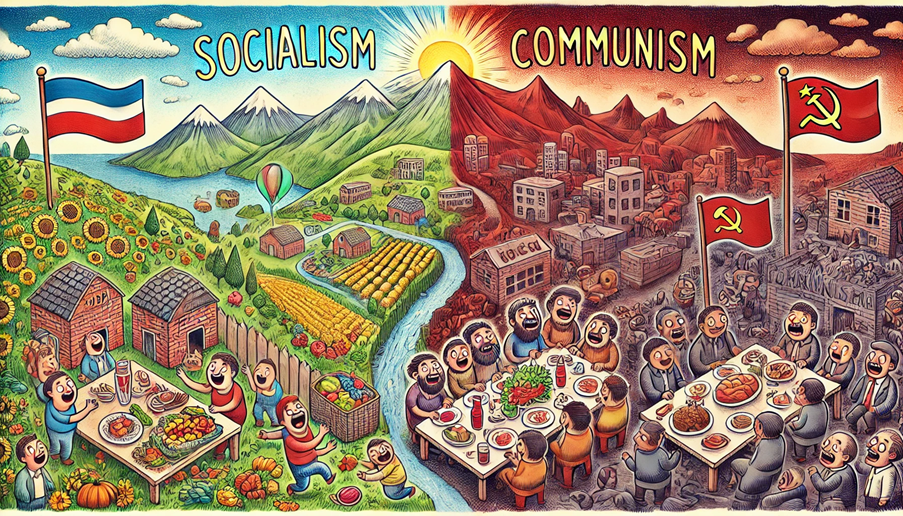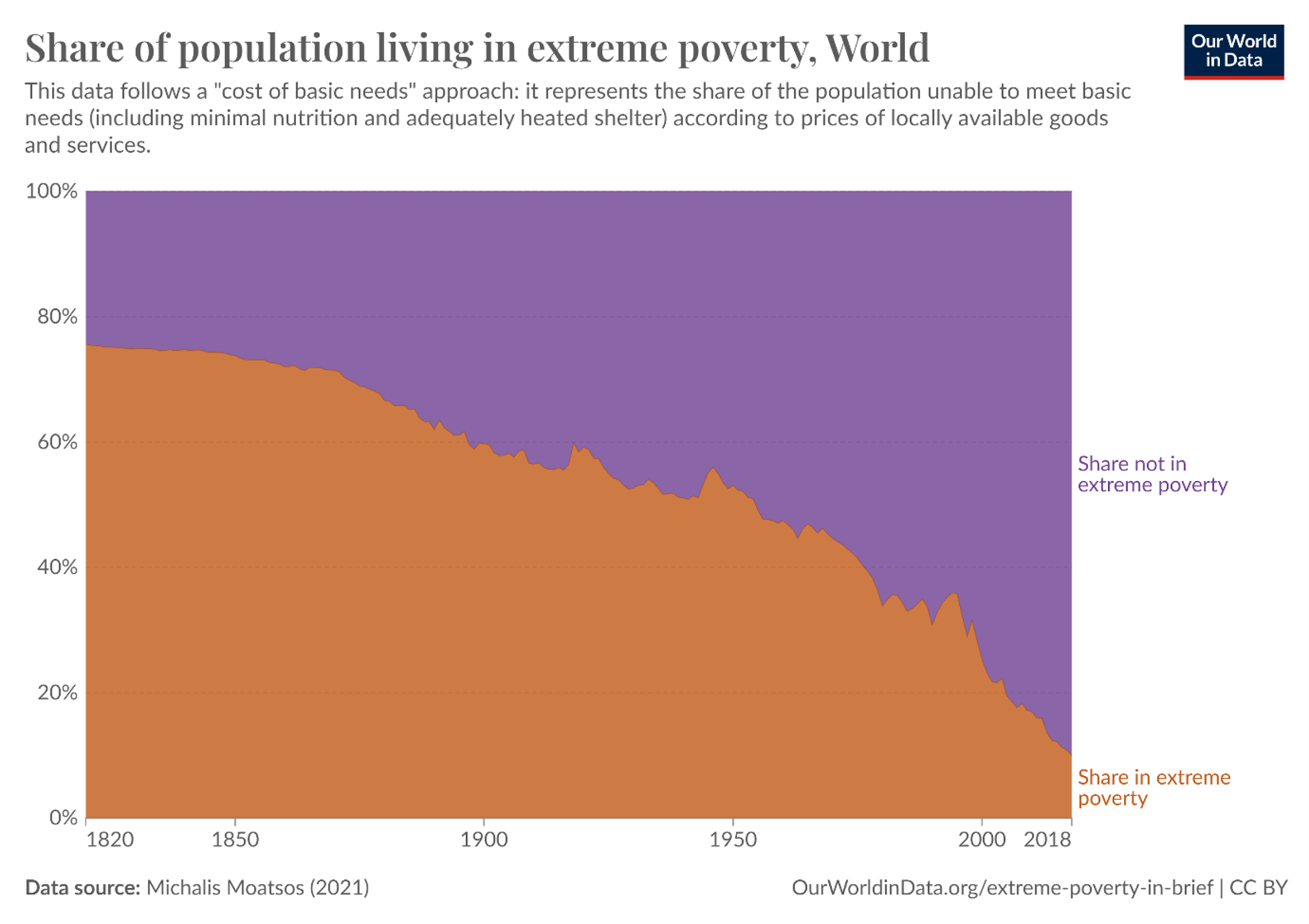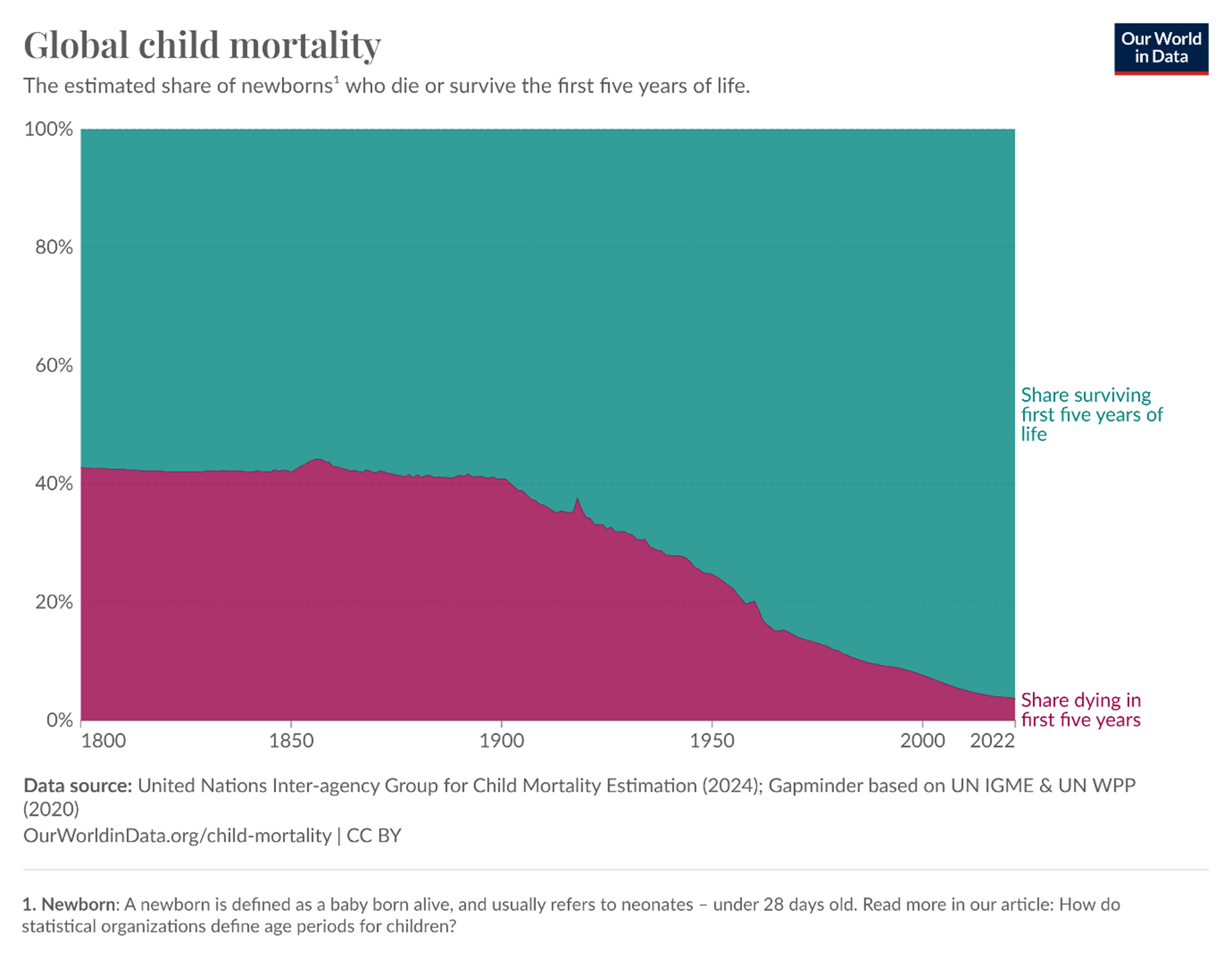A friend told me a joke recently.
It went like this: ‘What’s the difference between socialism and communism? Well, in socialism, everyone shares the wealth. Meanwhile, in communism, everyone shares the poverty.’

Source: Image generated by OpenAI’s DALL-E
Is there any truth to this? Well, let’s take a look at some real-world examples here:
- Developed countries that have welfare models built on consensus will tend to use the term ‘social democracy’. You will see this in Norway, Denmark, Sweden, Finland, and Iceland.
- Meanwhile, emerging countries with a history of violent revolution and authoritarian crackdown will tend to embrace the label ‘communism’. You will see this in the former Soviet Union and the People’s Republic of China.
On the surface of it, the distinction appears clear. However, critics will reject the difference. They say that socialism and communism are actually two sides of the same coin. They say that the socialism is actually communism by stealth:
- For example, a relative of mine is conservative. His comment on this issue is quite blunt: ‘Communism is the best system for lazy people.’
- Why? Well, his reasoning is simple. When everything is centrally owned by the government, private enterprise falls by the wayside. There is no desire to improve. No desire to compete. No desire to take any risk at all.
Yes, of course. Risk-taking is a natural part of capitalism. You will find that people are more willing to engage in risk when they are motivated by a financial reward:
- Economist Thomas Piketty highlights one undeniable fact: income generated by capital is always going to be stronger than income generated by labour.
- This is why people who invest in businesses will tend to get wealthier over time compared to people who rely on wages alone.
- Indeed, productive assets have a compounding effect. This snowballs over time. Amplifying, magnifying, expanding. This effect may appear subtle in the short run, but it becomes more profound over the long run.
- Warren Buffett himself has said: ‘If you don’t find a way to make money while you sleep, you will work until you die.’
However, does this create a wealth gap? A disconnect between the haves and have-nots; the privileged and the underprivileged?
- Well, our news cycle tends to be dominated by social-justice warriors. They will usually talk about the disadvantages of capitalism. They will say that entrepreneurs are greedy. Selfish. Exploitive.
- However, what these keyboard warriors seem to overlook are the advantages of capitalism. Positive things are actually happening outside the news cycle, unfolding over the long-term.

Source: Our World in Data

Source: Our World in Data
So, here’s what the big picture looks like:
- In the year 1900, 60% of the world lived in extreme poverty. However, today, that number is only 10%.
- Meanwhile, in the year 1900, 40% of children did not live to see their 5th birthday. However, today, that number is only 4%.
- Indeed, when you look at the long tail of history — which stretches over decades, across generations — you will see extraordinary progress.
- Yes, entrepreneurs have done a great deal of good. They have created products and services that have solved problems. Uplifting human society. Supercharging our quality of life.
- As a result, you might argue that even the poorest person in New Zealand today is actually better off than the average person was a century ago. Astonishing.
So, despite its faults and frailties, capitalism remains the best driver of prosperity. Its ability to compound and snowball over time is formidable:
- In 1978, Chinese leader Deng Xiaoping acknowledged this. He said: ‘To get rich is glorious.’ So, he hit the reset button on his country. He gave up on pure ideological communism. He went on to embrace what became known as ‘capitalism with Chinese characteristics’. In doing so, over 800 million people were lifted out of poverty.
- Meanwhile, Norway is well-known for offering generous welfare benefits. For example, who doesn’t love receiving 49 weeks of fully paid parental leave? Also, who doesn’t love getting free dental care until the age of 19? On the surface of it, this looks like socialism. But, really, it’s just a flexible form of capitalism.
- Most notably, the Government Pension Fund of Norway is underpinned by oil and gas revenue. As of November 2024, it has over USD $1.7 trillion in assets under management. It owns roughly 1.5% of every listed company on Earth. This may very well make it the single largest sovereign wealth fund around.
So, in the grand scheme of things, this suggests that capitalism is not a villain to be cancelled and censored. Rather, capitalism is a benevolent force of nature. Its natural habitat is risk-taking. It needs to be respected. It needs to be given sufficient space to grow and flourish:
- Sure, the wokesters will tell you about everything that capitalism has done wrong. But watch out. They will tell you almost nothing about what capitalism has done right.
- Indeed, capitalism is the steam engine that drives human resilience and courage. To snuff that out is to snuff out human potential itself.
We want to hear from you
Your prosperity is our focus — which is why we are always working hard to uncover new opportunities beyond the radar for you. We’re eager for your feedback:
- If you have enjoyed this article, please consider leaving us a review.
- Let us know what you liked. Let us know what inspired you. Let us know if it’s made you a better investor.
Regards,
John Ling
Analyst, Wealth Morning
(This article is the author’s personal opinion and commentary only. It is general in nature and should not be construed as any financial or investment advice. Wealth Morning offers Managed Account Services for Wholesale or Eligible investors as defined in the Financial Markets Conduct Act 2013.)





John is the Chief Investment Officer at Wealth Morning. His responsibilities include trading, client service, and compliance. He is an experienced investor and portfolio manager, trading both on his own account and assisting with high net-worth clients. In addition to contributing financial and geopolitical articles to this site, John is a bestselling author in his own right. His international thrillers have appeared on the USA Today and Amazon bestseller lists.